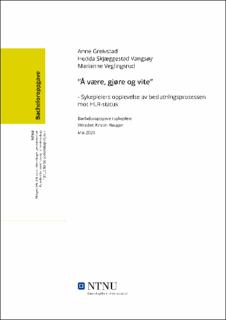| dc.contributor.advisor | Haugen, Kristin | |
| dc.contributor.author | Greivstad, Anne | |
| dc.contributor.author | Vangsøy, Hedda Skjæggestad | |
| dc.contributor.author | Veglingsrud, Marianne | |
| dc.date.accessioned | 2020-07-22T16:03:04Z | |
| dc.date.issued | 2020 | |
| dc.identifier | no.ntnu:inspera:56389038:58700843 | |
| dc.identifier.uri | https://hdl.handle.net/11250/2669978 | |
| dc.description.abstract | Kort beskrivelse av master/bacheloroppgaven:
Bakgrunn: Ofte oppstår det usikkerhet og uklarheter i klinisk sykepleiepraksis vedrørende beslutningsprosesser som omhandler livets sluttfase. Etiske og juridiske verdier, eksempelvis den lovfestede plikten til å utføre helsehjelp, eller respekt for enkeltmenneskets rett til autonomi er noen av mange forhold som spiller inn i en slik beslutningsprosess.
Hensikt: Hensikten med denne litteraturstudien er å se nærmere på hvordan sykepleiere opplever sitt juridiske og etiske ansvar i beslutningsprosesser vedrørende HLR-status.
Metode: Oppgaven er en litteraturstudie der vi har gjennomført søkt i Medline (Ovid), Cinahl Complete, PubMed (Medline) og SveMed+. Vi har brukt følgende søkeord: CPR, CPR orders, Nurse, Ethical issues, DNR, Primary health care, Resuscitation orders, Palliative care, Resuscitation decision, Ethics. Det ble inkludert seks artikler i studien.
Resultat: Sykepleiere opplever ofte mangel på formell opplæring knyttet til beslutningsprosessen mot HLR-status. Det kommer frem i studien at sykepleiere syns det er vanskelig å snakke med pasienter og deres pårørende om beslutninger vedrørende HLR, men de mener likevel det er viktig å gjennomføre slike samtaler. Sykepleiere opplever også usikkerhet knyttet til eget ansvar vedrørende etiske og juridiske avveininger. God etisk kompetanse framstår som viktig for å håndtere etiske dilemmaer som oppstår i beslutningsprosessen mot HLR-status.
Konklusjon: Økt fokus på tydelige krav og retningslinjer, den utfordrende samtalen, sykepleiers juridiske ansvar, samt styrking av etisk kompetanse vil kunne påvirke sykepleiers opplevelse av beslutningsprosessen vedrørende HLR-status. | |
| dc.description.abstract | Short description of the bachelor thesis:
Background: Uncertainty often arise in clinical nursing practice regarding decision-making processes that deal with the end phase of life. Ethical and legal values, such as the statutory duty to provide health care, or respect for the individual's right to autonomy are some of the many factors that play a role in such a decision-making process.
Aim: The purpose of this literature study is to look more closely at how nurses perceive their legal and ethical responsibilities in decision making regarding CPR status.
Method: The thesis is a literature study where we have conducted searches in Medline (Ovid), Cinahl Complete, PubMed (Medline) and SveMed +. We have used the following keywords: CPR, CPR orders, Nurse, Ethical issues, DNR, Primary health care, Resuscitation orders, Palliative care, Resuscitation decision, Ethics. Six articles were included in the study.
Results: Nurses experience a lack of formal training related to this decision-making process. The study reveals that nurses find it difficult to talk to patients and their relatives about CPR decisions, but they still believe it is important to have these conversations. Nurse experiences uncertainty related to own responsibility regarding ethical and legal considerations. Good ethical competence appears to be important for dealing with ethical dilemmas that arise in the decision-making process against CPR status.
Conclusion: Increased focus on clear requirements and guidelines, the challenging conversation, the nurse 's legal responsibility and the strengthening of ethical competence may influence the nurse' s perception of the decision-making process regarding CPR status. | |
| dc.language | | |
| dc.publisher | NTNU | |
| dc.title | «Å være, gjøre og vite» - Sykepleiers opplevelse av beslutningsprosessen mot HLR-status | |
| dc.type | Bachelor thesis | |
